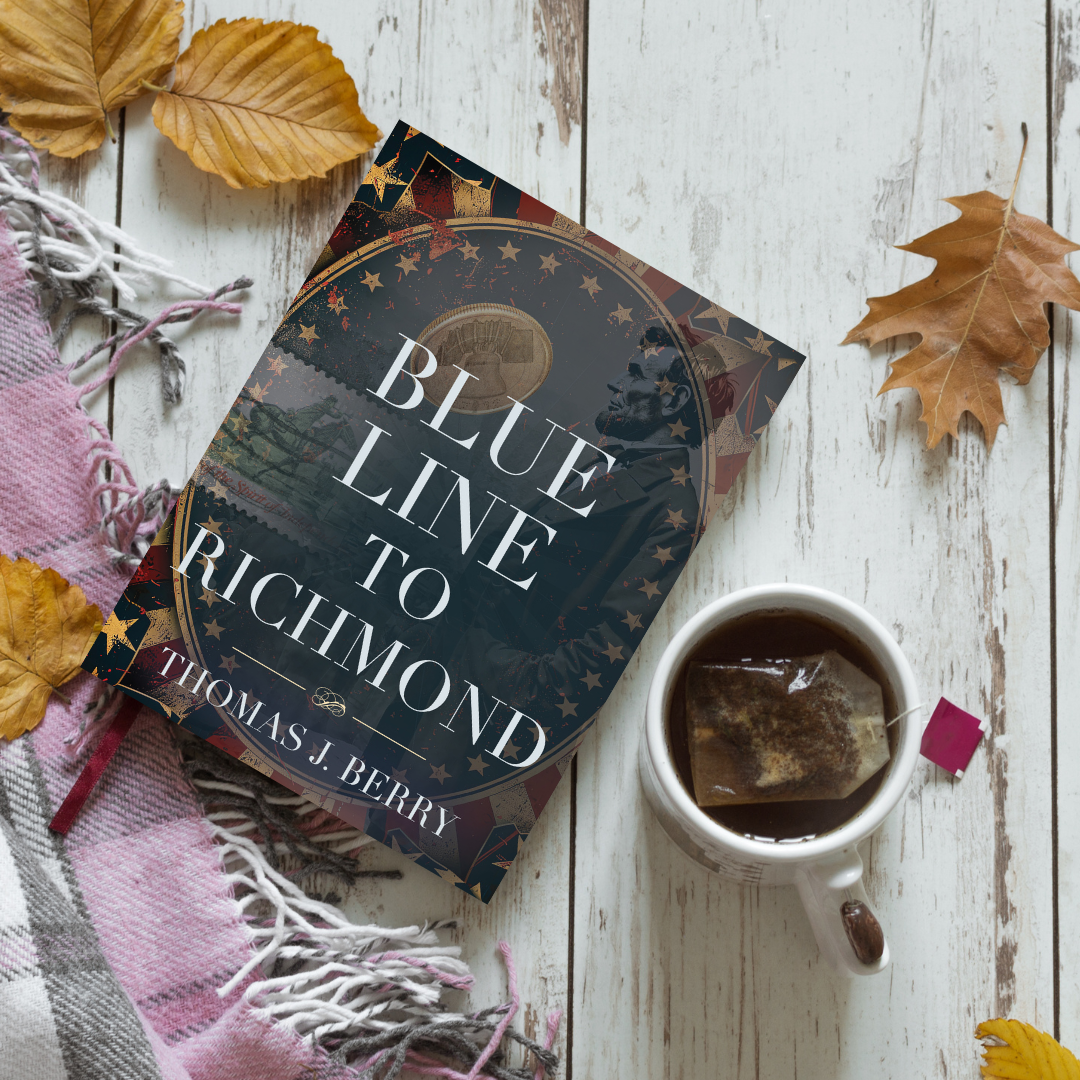
Book Review:
Blue Line to Richmond
The Historical Fiction Company, Sept 2024
Genre: Historical Fiction
Title: Blue Line to Richmond
Author: Thomas Berry
"A Great Read!"
"Fiery sparks flew in all directions with each resounding swing of the hammer. Strong calloused
hands gripped the heavy instrument as the small object glowed red as the sun above. Sweat
dripped down his cheek and hissed angrily on the hot metal forge. As copper infused with tin, an
acrid scent rose in the air. Slowly, the product began to take shape. The man's eyes widened with
anticipation. The boiling metals swirling in the caldron near him cast his face in a macabre
expression. "It's going to be a thing of beauty, Paul.""
Blue Line to Richmond immediately immerses the reader in conflict, commencing with the
symbolic heat of the forge, shaping a medallion - referencing the momentous nation shaping
conflict of the American Revolution - before detailing the Civil War. The story starts in 1792, where
the legendary Paul Revere is creating a medallion. The writing style is detailed, but there is much
to cover, with the narrative focused on Paul Revere and his descendants, combined with the
additional storylines of Morton Tower and Elizabeth Van Lew.
The significance of the medallion echoes down the decades, and the author skilfully combines both
the internal and external challenges of the historical figures/characters, their friends and families.
The stark toll of the Civil War and the decimation of lives and societies (and thankfully, the end of
slavery) is laid bare in Blue Line to Richmond with the privations of the battlefields authentically
described. References to abolitionist themes are also a welcome addition to the novel,
differentiating the book from others that focus only on battlefield conflicts. Here, Berry has crafted a
narrative that weaves together conflict that is social, military and personal.
In 1862 the reader meets Second Lieutenant Morton Tower, a commissioned officer in Lincoln's
army. In other hands, Berry's references to the famous battles of American history could be dry and
historical, but instead the author has taken considerable care to give every military development a
personal perspective, as Morton Tower loses friends, engages with the enemy, and struggles with
the personal reality of war.
"Morton was 21 years of age, a resident of Randolph, a few miles south of the big city. He was a
man of medium height, with a strong, athletic frame, but unlike many of his peers in the army, he
was clean-shaven which often made him appear youthful and disarming. He had enlisted after the
fall of Fort Sumter along with many of his patriotic neighbors and mustered in shortly afterward to
what had been expected to be a short war. The order was given to rise and march north along the
Hagerstown Pike, further away from the fighting while other brigades joined in the battle. The men
were desperately short of ammunition. Morton was shocked to find only a handful of lead balls left
in his cartridge box. That wouldn't last more than a few minutes in a firefight, he realized. His
buddies were undoubtedly in the same predicament."
Elizabeth Van Lew, a complex historical figure, is a fascinating further addition to the narrative. Her
concerns and actions as the Civil War draws to a close mirror the uncertainty in society of that
time, and the danger inherent in overtly stating beliefs where the war has cost so many so much. It
is to the author's considerable credit that he writes from both a male and female perspective so
convincingly, as he successfully sets out the motivations of each historical figure (and secondary
character) and provides the reader with a glimpse of their personalities.
"Virginia bluebells and pink rhododendrons were taking bloom in her garden, amid the large
gazebo that looked out over the swiftly moving James River and the prison warehouse at the foot
of Chapel Hill. She had spent an hour there this morning tending the garden with William, Peter's
father. He was a year past his fiftieth birthday, or so he thought, but there were no estate records
to verify it. Dates mattered little to him though. William had worked the grounds of the estate for
over 17 years and the Van Lews had been kind to him. It was enough."
The pacing of Blue Line to Richmond is well-balanced, and several of the chapters are headlined
to orientate the reader as to the date and place of the content. This is particularly useful in the
chapters relating to Morton Tower. The ending of the novel is a poignant and emotionally touching
conclusion to the narrative, confirming the ways in which those featured in the novel are inter-
connected with each other.
Blue Line to Richmond by Thomas J. Berry will take the reader on an engaging journey through
some of America's most turbulent times. This historical novel is a standout among others in this
genre because of the author's strong focus on characterisation and the personal motivations of the
main characters, set against the emotion and tragedy of such a pivotal era. The battlefields scenes
are gritty and realistic, adding to the authenticity of the novel and effortlessly demonstrating the
detailed research Berry has undertaken to write such a work. A great read!
I Highly Recommend.
Review by D. K. Marley.
The Historical Fiction Company
Title: Blue Line to Richmond
Author: Thomas J. Berry
Publisher: booklocker.com
Pages: 394
Sept 2024
| 